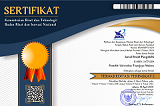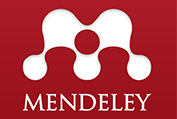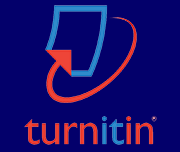Pengoptimalan Manajemen Wakaf Produktif Dalam Mendorong Terwujudnya Sustainable Development Goals (SDGs)
Abstract
The purpose of this community service is to increase students' understanding, skills, and participation in managing productive waqf as an instrument for achieving sustainable development. The training was held at the Unwaha Jombang and IAIN Kediri campuses, involving a total of 80 participants. The methods used in this training include delivering relevant materials, case studies, group discussions, field practice, and visits to productive waqf institutions. During the training, participants are given an in-depth understanding of the concepts of productive waqf, financial management, reporting, and evaluation. They are also involved in field practice to apply the knowledge they have acquired to actual productive waqf management. The evaluation results show that this training succeeded in increasing participants' understanding of productive waqf and the importance of the role of students in pushing for the realization of the SDGs. In addition, participants also develop practical skills in managing waqf assets and formulating sustainable business plans. This training also encourages collaboration and networking between students, lecturers, and related institutions to create synergies in the development of productive waqf.
Keywords
Full Text:
PDF (Bahasa Indonesia)References
Abiba, R. W., & Suprayitno, E. (2023). Optimalisiasi Wakaf Produktif dalam Mendukung Upaya Pencapaian SDGs Melalui Pemberdayaan Peternakan. Al-Intaj : Jurnal Ekonomi Dan Perbankan Syariah, 9(1), 109. https://doi.org/10.29300/aij.v9i1.9073
Arafah, S., Miko, J., & Septiani, R. (2023). Implementasi Wakaf Produktif Dalam Meningkatkan Produktivitas Ekonomi Masyarakat. CORAL (Community Service Journal), 2(1), 142–154.
Fattach, A., & Maskun, M. (2022). Konsepsi Strategis Pengembangan Wakaf Produktif melalui Investasi Berbasis Syariah. Management of Zakat and Waqf Journal (MAZAWA), 3(2), 51–65. https://doi.org/10.15642/mzw.2022.3.2.51-65
Lubis, H. (2023). Tingkat Pemahaman Generasi Z terhadap Wakaf Uang di Kota Pekanbaru. El-Jizya : Jurnal Ekonomi Islam, 11(1), 71–86. https://doi.org/10.24090/ej.v11i1.7131
Maclure, L. (2021). Augmentations to the asset-based community development model to target power systems. https://doi.org/https://doi.org/10.1080/15575330.2021.2021964
Makhrus, M. (2019). Dinamika Kebijakan Negara dalam Pengelolaan Wakaf di Indonesia. JSSH (Jurnal Sains Sosial Dan Humaniora), 2(2), 209. https://doi.org/10.30595/jssh.v2i2.3137
Mustofa, I. (2021). Nalar Filosofis Sustainable Development Goals (SDGS) dalam Tata Kelola Filantropi Islam Berbasis Masjid di Surabaya. Maliyah : Jurnal Hukum Bisnis Islam, 11(1), 129–156. https://doi.org/10.15642/maliyah.2021.11.1.129-156
Riyaldi, M. H., Suriani, S., & Nurdin, R. (2020). Optimization Zakat for Sustainable Development Goals: Evidence from Baitul Mal Aceh. International Conference of Zakat, 339–354. https://doi.org/10.37706/iconz.2020.223
Rohim, A. N. (2021). Optimalisasi Wakaf sebagai Instrumen Pembiayaan UMKM untuk Pengembangan Industri Halal. Jurnal Bimas Islam, 14(2), 311–344. https://doi.org/10.37302/jbi.v14i2.427
Rosyid, M. (2016). Peran Sertifikat Tanah Wakaf Dalam Mengantsipasi Dinamika Zaman: Studi Kasus Madrasah Diniyah Muawanatul Muslimin Di Kudus. ZISWAF : Jurnal Zakat Dan Wakaf, 3(1), 98–126. https://journal.iainkudus.ac.id/index.php/Ziswaf/article/view/2285
Sa’adah, M., & Hasanah, U. (2021). The Common Goals of BAZNAS’ Zakat and Sustainable Development Goals (SDGs) according to Maqasid Al-Sharia Perspective. Al-Ihkam: Jurnal Hukum Dan Pranata Sosial, 16(2), 302–326. https://doi.org/10.19105/AL-LHKAM.V16I2.4990
Saripudin, U. (2016). Filantropi Islam Dan Pemberdayaan Ekonomi. BISNIS : Jurnal Bisnis Dan Manajemen Islam, 4(2), 165. https://doi.org/10.21043/bisnis.v4i2.2697
Savitri Nur Setyorini, Wirdyaningsih, C. A. H. (2020). Wakaf Lingkungan Hidup Dalam Rangka Pelaksanaan Pembangunan Berkelanjutan Dan Penegakkan Keadilan Antargenerasi. Journal of Islamic Law Studies, Sharia Journal, 3(1), 98–132.
Sholichah, N. I. (2023). Sosialisasi dan Implementasi Wakaf Produktif dalam Rangka Pemberdayaan Masyarakat di Desa Kaliuling Kecamatan Tempursari, Kabupaten Lumajang. Jurnal Inovatif Dan Kreatif Hasil Pengabdian Kepada Masyarakat, 1(2), 136–144.
Virgiawan, A. A. (2022). Pengelolaan Wakaf Produktif Untuk Meningkatkan Kesejahteraan Masyarakat (Studi Pada RS Mata Achmad Wardi Bwi Kota Serang). JURHIS Jurnal Mahasiswa Hukum Islam, 1(1), 31–50.
Zunaidi, A. (2021). Wakaf Keluarga Perspektif UU No. 41 Tahun 2004 dan Maqasid Al-Usrah Jamal Al-Din Atiyyah. Mahakim: Journal of Islamic Family Law, 5(2), 115–133. https://doi.org/10.30762/mahakim.v5i2.137
Zunaidi, A. (2022). Productive Waqf in Maqasid Sharia Perspective. Al’Adalah, 25(1), 93–104. https://doi.org/10.51311/nuris.v6i1.122.1
DOI: https://doi.org/10.21107/pangabdhi.v9i2.21276
Refbacks
- There are currently no refbacks.
Copyright (c) 2023 Arif Zunaidi, Rifdah Nazilatul Rizqiyyah, Fika Kemala Nikmah, Fachrial Lailatul Maghfiroh

This work is licensed under a Creative Commons Attribution-ShareAlike 4.0 International License.
Jurnal Ilmiah Pangabdhi by Universitas Trunojoyo Madura is licensed under a Creative Commons Attribution-ShareAlike 4.0 International License.













